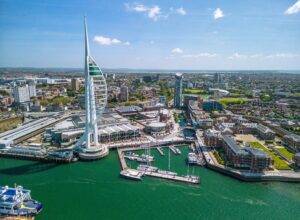Portsmouth International Port’s new £24 million border control post, built to handle post-Brexit border arrangements, may be demolished due to changes in border protocols rendering it commercially unviable.
The facility, funded by both the central government and Portsmouth City Council, was designed to process up to 80 truckloads of produce daily but is now expected to handle only a fraction of that volume.
Similar challenges are faced by ports nationwide, where oversized and over-specified border control facilities are struggling to cover operating costs amid reduced traffic. Despite the Department for Environment, Food and Rural Affairs (DEFRA) investing £200 million in new facilities across 41 ports, fewer checks are now required, leaving many facilities underutilized.
The Portsmouth facility’s uncertain future has prompted discussions about building a smaller, commercially viable replacement or repurposing the land for other projects. The council, which contributed £7 million to the facility, is seeking reimbursement from the government.
The potential closure of the facility could impact the security of UK food imports, as Portsmouth serves as an alternative route to Dover, providing crucial resilience to the supply chain.
However, concerns persist about the preparedness of new inspection regimes at border control posts nationwide, with ports still awaiting crucial information from the government regarding operating hours, staffing requirements, and inspection fees.
The fate of the Portsmouth facility underscores the challenges and uncertainties surrounding post-Brexit border controls and import arrangements, highlighting delays and indecision since the Brexit deal came into force in January 2021.
Read more:
Portsmouth’s £24M Brexit border could be demolished

